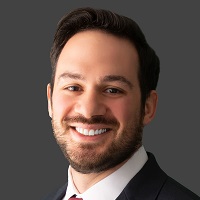Seven Financial Planning Strategies for Physicians
Doctors have added financial planning challenges, such as the necessity of malpractice insurance. Here are seven issues to stay on top of.


Profit and prosper with the best of Kiplinger's advice on investing, taxes, retirement, personal finance and much more. Delivered daily. Enter your email in the box and click Sign Me Up.
You are now subscribed
Your newsletter sign-up was successful
Want to add more newsletters?

Delivered daily
Kiplinger Today
Profit and prosper with the best of Kiplinger's advice on investing, taxes, retirement, personal finance and much more delivered daily. Smart money moves start here.

Sent five days a week
Kiplinger A Step Ahead
Get practical help to make better financial decisions in your everyday life, from spending to savings on top deals.

Delivered daily
Kiplinger Closing Bell
Get today's biggest financial and investing headlines delivered to your inbox every day the U.S. stock market is open.

Sent twice a week
Kiplinger Adviser Intel
Financial pros across the country share best practices and fresh tactics to preserve and grow your wealth.

Delivered weekly
Kiplinger Tax Tips
Trim your federal and state tax bills with practical tax-planning and tax-cutting strategies.

Sent twice a week
Kiplinger Retirement Tips
Your twice-a-week guide to planning and enjoying a financially secure and richly rewarding retirement

Sent bimonthly.
Kiplinger Adviser Angle
Insights for advisers, wealth managers and other financial professionals.

Sent twice a week
Kiplinger Investing Weekly
Your twice-a-week roundup of promising stocks, funds, companies and industries you should consider, ones you should avoid, and why.

Sent weekly for six weeks
Kiplinger Invest for Retirement
Your step-by-step six-part series on how to invest for retirement, from devising a successful strategy to exactly which investments to choose.
When my wife became a doctor, I saw the financial challenges that physicians and other medical professionals face due to heavy workloads, long hours and the emotional stress of their jobs. Sadly, many medical professionals, especially doctors, often overlook financial planning. The purpose of this article is to guide physicians in accessing financial resources and strategies that can help safeguard and grow their wealth while minimizing taxes.
1. Navigating student loan repayment
It’s no secret a career in medicine is expensive, so many medical students take out government and private loans for their degrees. During residency, doctors usually have limited income, so they pay the minimum amount on student loans. Once they have better income, they can allocate more money to pay off the loans.
I advise clients to make additional payments to the principal amount instead of just paying the interest. They should start with high-interest loans and pay off private loans before federal loans.
From just $107.88 $24.99 for Kiplinger Personal Finance
Become a smarter, better informed investor. Subscribe from just $107.88 $24.99, plus get up to 4 Special Issues

Sign up for Kiplinger’s Free Newsletters
Profit and prosper with the best of expert advice on investing, taxes, retirement, personal finance and more - straight to your e-mail.
Profit and prosper with the best of expert advice - straight to your e-mail.
The Biden administration's efforts to forgive federal loan debt may have been delayed, but they have introduced other loan forgiveness programs that incentivize paying off private loans first.
2. The necessity of malpractice insurance
In some cases, hospitals provide malpractice insurance, but doctors in private practice often have to buy their own. This is a key reason why many doctors prefer large networks over smaller private practices.
Malpractice insurance is expensive, and doctors are likely to face legal action in their careers. In 2022, one-third of doctors reported a medical lawsuit, according to an analysis by the American Medical Association. While two-thirds of these cases are eventually dropped, one-third make it to trial, where they are decided by verdict — another expensive process, no matter the outcome. Surgical specialties face the highest risk of lawsuits, while internal medicine subspecialties face the lowest risk, according to the same AMA analysis.
The cost of malpractice insurance varies depending on the doctor's specialty, but it is highly recommended to have the appropriate coverage in place, whether provided by the hospital or the private practice.
Additionally, it is crucial to maintain meticulous records of the care provided and to document verbal consultations with patients and their families. These notes can be used in the defense against any potential lawsuit.
3. Hedge occupational hazards with disability insurance
Some hospitals offer disability insurance, while others do not. Carefully read and understand the benefits and limitations of the disability insurance plans, as well as how much they will pay in the event of a disability incident. Some plans may cover only up to 25% of your income.
Many doctors choose to work with an independent adviser to find a disability insurance plan outside of their hospital network. This allows doctors to have more control over the coverage they desire. For example, some doctors may prefer to have 75% or 100% of their income continue to support their household during a disability incident. Remember, the more income-replenishing coverage a doctor wants, the higher the premiums will be for that policy.
4. Negotiating post-residency employment contracts
It's important to note that employment contracts are negotiable. While some privileges may be easier to attain than others, there is a certain level of flexibility that both small and large employers can offer. Many institutions have standard contracts for physicians who have just completed their residency.
Many doctors have had success in negotiating for sign-on bonuses, moving allowances, working hours per week, dictating commute distances and advocating for more vacation and paid time off.
Always have an attorney review your contract and try to remember that attorneys are experts in legal jargon, not medical jargon. Doctors may need to assist the attorney in understanding key language in the contract. Therefore, it is vital for both the doctor and the attorney to thoroughly read and understand the contract before the doctor signs the employment agreement.
5. Review life insurance policies
Doctors are often underinsured when it comes to life insurance. Bad news, considering they’re also often the primary breadwinners of the household. There are many ways to calculate the death benefit needed, but in most cases, about seven to 10 times the gross annual income is in the ballpark. For example, a doctor earning $100,000 per year should have between $700,000 and $1 million worth of death benefits so their family can have income protection should the doctor die prematurely. Physicians take certain risks due to their occupational exposure that warrant this preventive measure for the family.
There are two main categories of life insurance: term insurance and permanent insurance. Term life insurance is initially cheaper and provides coverage for a specific period. However, it has no cash value, and the cost increases significantly after the term period ends. Permanent life
insurance costs more initially but can stay in place until the insured person dies. It offers cash value growth potential and may include long-term care benefits.
A combination of term and permanent life insurance policies can be used to fit the insured's budget while ensuring adequate coverage. A popular strategy is to utilize a combination of term and permanent life insurance policies to fit the budget of the insured while attaining the right amount of coverage.
6. Saving for retirement: 403(b)s and 401(k)s
Most hospital networks offer retirement plans like a 403(b) or 401(k). Contribute at least up to the matched amount in these programs to earn a 100% return on your investment. You can choose to contribute to a pre-tax or a Roth account within the retirement plan. Contributions to the pre-tax account give you an income tax deduction and grow on a tax-deferred basis.
When you reach retirement age and want to withdraw funds, these withdrawals will be taxed at the prevailing income rates. Consider whether taxes will rise or fall in the future, as it can impact your retirement. Saving on a pre-tax basis and withdrawing from an IRA can lead to higher taxes on Social Security income and increased Medicare premiums throughout retirement.
It's generally better to pay taxes on the seed rather than the harvest of your savings. If you contribute to a Roth plan, you won't get an income tax write-off during the year of contribution, but your account will grow tax-free over the years. Withdrawals from a Roth account during retirement can be federally income tax-free and won't have tax consequences on your future Social Security income or increase Medicare premiums.
7. When is it enough to retire?
It is recommended to have around 15 times your annual income saved for retirement. If you want to live on $100,000 per year in retirement, you should have about $1.5 million in your savings to supplement other retirement income sources.
Not everyone will reach this goal, but it means that their investments will need to perform well for a stable retirement cash flow. One popular retirement strategy is to invest a portion of your portfolio in an annuity, which provides pension-like income. However, it is important to note that annuities can vary in fees, risk levels, guarantees and ratings. It is highly advisable to consult an independent adviser who specializes in annuities when considering a purchase, especially if you are nearing or in retirement.
The bottom line
It is important to spend time interviewing financial professionals until you find one that can help with the unique challenges doctors face. Wealth managers who work for large firms are considered "captured agents'' because they are employed by those institutions. These firms have shareholders, and there may be conflicts of interest in the services provided to clients.
There are smaller independent firms that operate at a higher ethical standard. These advisers prioritize their clients' interests. Independent advisers may offer more investment options than their competitors. Whatever you choose, the most important thing is that you feel confident in the professional you’re working with and in the advice you receive.
Related Content
- Five Financial Moves to Make as Year's End Approaches
- How to Build Your Financial House From the Foundation Up
- Should You Take Financial Planning Advice From AI?
- Financial Planning in an Age of Increasing Longevity
- Financial Planning by Life Stage Focuses on You, Not Your Age
Profit and prosper with the best of Kiplinger's advice on investing, taxes, retirement, personal finance and much more. Delivered daily. Enter your email in the box and click Sign Me Up.

Nick Guida takes pride in creating a welcoming environment to help affluent individuals, families and foundations gain access to strategies and resources that are custom-built for their particular circumstances. The way Nick envisions the relationships with the people he serves is that they’re the CEO, and he and his firm are the supportive CFO bringing well-vetted resources and advanced tax planning strategies to the table. Nick has demonstrated his industry knowledge by writing articles published by Fortune.com, Money.com, Annuity 123 and Forbes.com.
-
 Dow Leads in Mixed Session on Amgen Earnings: Stock Market Today
Dow Leads in Mixed Session on Amgen Earnings: Stock Market TodayThe rest of Wall Street struggled as Advanced Micro Devices earnings caused a chip-stock sell-off.
-
 How to Watch the 2026 Winter Olympics Without Overpaying
How to Watch the 2026 Winter Olympics Without OverpayingHere’s how to stream the 2026 Winter Olympics live, including low-cost viewing options, Peacock access and ways to catch your favorite athletes and events from anywhere.
-
 Here’s How to Stream the Super Bowl for Less
Here’s How to Stream the Super Bowl for LessWe'll show you the least expensive ways to stream football's biggest event.
-
 How to Add a Pet Trust to Your Estate Plan: Don't Leave Your Best Friend to Chance
How to Add a Pet Trust to Your Estate Plan: Don't Leave Your Best Friend to ChanceAdding a pet trust to your estate plan can ensure your pets are properly looked after when you're no longer able to care for them. This is how to go about it.
-
 Want to Avoid Leaving Chaos in Your Wake? Don't Leave Behind an Outdated Estate Plan
Want to Avoid Leaving Chaos in Your Wake? Don't Leave Behind an Outdated Estate PlanAn outdated or incomplete estate plan could cause confusion for those handling your affairs at a difficult time. This guide highlights what to update and when.
-
 I'm a Financial Adviser: This Is Why I Became an Advocate for Fee-Only Financial Advice
I'm a Financial Adviser: This Is Why I Became an Advocate for Fee-Only Financial AdviceCan financial advisers who earn commissions on product sales give clients the best advice? For one professional, changing track was the clear choice.
-
 I Met With 100-Plus Advisers to Develop This Road Map for Adopting AI
I Met With 100-Plus Advisers to Develop This Road Map for Adopting AIFor financial advisers eager to embrace AI but unsure where to start, this road map will help you integrate the right tools and safeguards into your work.
-
 The Referral Revolution: How to Grow Your Business With Trust
The Referral Revolution: How to Grow Your Business With TrustYou can attract ideal clients by focusing on value and leveraging your current relationships to create a referral-based practice.
-
 This Is How You Can Land a Job You'll Love
This Is How You Can Land a Job You'll Love"Work How You Are Wired" leads job seekers on a journey of self-discovery that could help them snag the job of their dreams.
-
 65 or Older? Cut Your Tax Bill Before the Clock Runs Out
65 or Older? Cut Your Tax Bill Before the Clock Runs OutThanks to the OBBBA, you may be able to trim your tax bill by as much as $14,000. But you'll need to act soon, as not all of the provisions are permanent.
-
 The Key to a Successful Transition When Selling Your Business: Start the Process Sooner Than You Think You Need To
The Key to a Successful Transition When Selling Your Business: Start the Process Sooner Than You Think You Need ToWay before selling your business, you can align tax strategy, estate planning, family priorities and investment decisions to create flexibility.